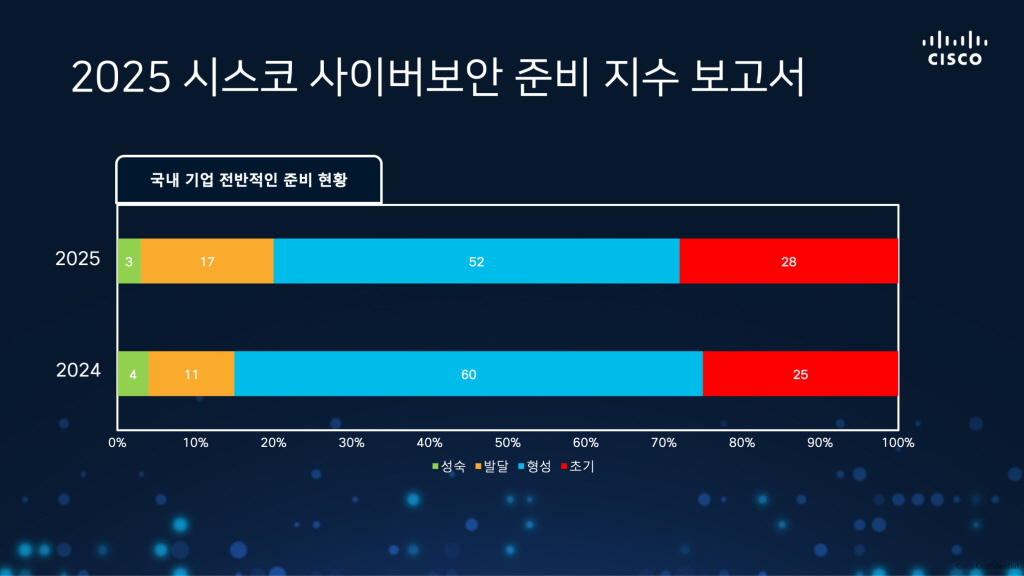시스코(Cisco)가 최근 발표한 2025년 사이버보안 준비 지수(Cybersecurity Readiness Index)에 따르면 한국 기업의 사이버보안 대비 수준이 여전히 낮으며, AI 기술 발전이 새로운 보안 위협을 초래하고 있는 것으로 나타났다.
시스코, ‘2025 사이버보안 준비 지수’ 발표
한국 기업의 사이버보안 대비가 여전히 낮은 수준인 것으로 나타났다.
시스코(Cisco)는 최근 2025년 사이버보안 준비 지수(Cybersecurity Readiness Index)를 발표했다.
보고서에 따르면 한국 기업의 사이버보안 대비 수준이 여전히 낮으며, AI 기술 발전이 새로운 보안 위협을 초래하고 있는 것으로 나타났다.
국내 기업 중 단 3%만이 ‘성숙(Mature)’ 단계의 사이버보안 준비 상태를 갖춘 것으로 확인됐다.
이는 지난해 4%에서 소폭 감소한 수치로, 기업들의 보안 역량 강화를 위한 추가적인 노력이 필요함을 시사한다.
특히 AI 관련 보안 사고를 경험한 기업이 전체의 83%에 달할 정도로 AI가 보안 환경에 미치는 영향이 크며, 이들 기업 중 30%만이 AI 기반 위협을 충분히 이해하고 있다고 응답해, AI가 보안 취약점을 더욱 심화시키고 있는 것으로 분석됐다.
한국 기업들의 사이버보안 환경은 점차 복잡해지고 있으며, 지난 1년간 전체 기업의 40%가 사이버 공격을 경험했다. 이에 따라 통합적인 보안 전략의 필요성이 더욱 강조되고 있다.
시스코의 지투 파텔(Jeetu Patel) 부회장 겸 최고제품책임자는 “AI가 기업을 근본적으로 변화시키면서 새로운 유형의 위협이 등장하고 있다”며 “인프라와 보안 인력에 대한 부담이 전례 없이 증가하고 있다”고 지적했다.
이어 “보안 전략을 재정비하지 않으면 AI 시대에서 도태될 수밖에 없다”고 경고했다.
한국 기업의 93%가 IT 인프라 업그레이드를 계획하고 있지만, 사이버보안에 IT 예산의 10% 이상을 배정한 기업은 33%에 불과한 것으로 나타났다.
이는 전년 대비 7% 감소한 수치로, 보안 강화를 위한 투자가 더욱 필요함을 보여준다.
또한, 기업들의 보안 인력 부족 문제가 심각한 것으로 드러났다. 전체 응답자의 97%가 숙련된 보안 인력이 부족하다고 응답했으며, 34%의 기업은 10개 이상의 보안 관련 포지션이 미충원 상태라고 답했다.
이러한 인력 부족은 보안 대응 속도를 늦추고, 위협 관리 능력을 저하시킬 수 있어 우려가 크다.
기업들은 사이버보안 위협이 AI 기술과 결합해 더욱 정교해지고 있는 만큼, AI 기반 보안 솔루션에 대한 투자를 확대하고, 직원들의 보안 인식을 개선해야 한다. AI 위협 탐지·대응·복구 전 과정에서 AI를 활용하는 전략적 접근이 필수적이며, 관리되지 않는 디바이스 및 섀도 AI로 인한 리스크도 체계적으로 관리할 필요가 있다.
시스코코리아 최지희 대표는 “국내 기업들이 단순 방어를 넘어 위협 발생 이후의 복구와 회복까지 아우르는 보안 회복탄력성을 갖추는 것이 필수적”이라며 “AI 기반 위협 대응 역량을 강화하고, 새로운 리스크를 포괄하는 보안 포트폴리오 구축이 어느 때보다 절실하다”고 강조했다.
